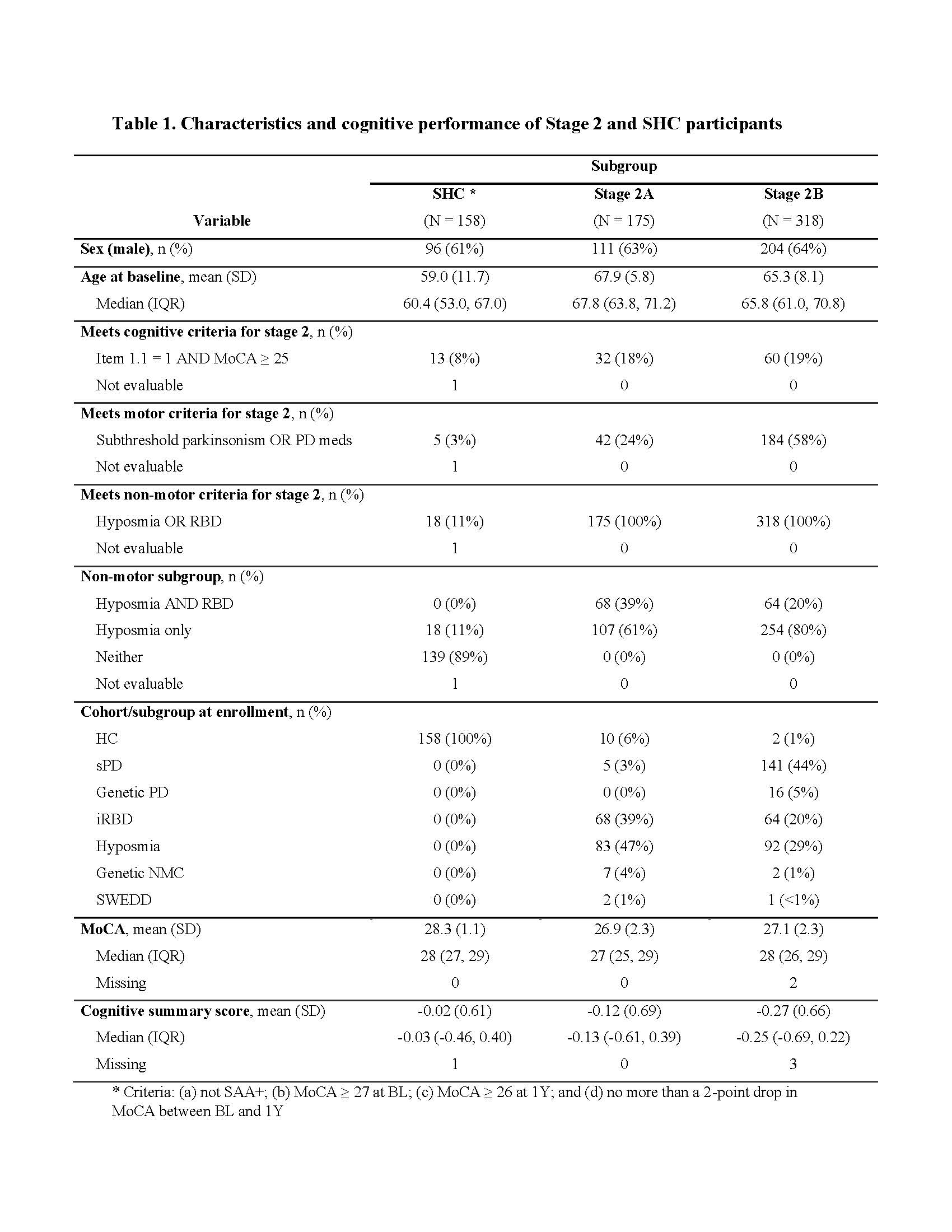Category: Parkinson's Disease: Cognitive functions
Objective: To determine if cognitive deficits can be detected in early-stage Neuronal alpha-Synuclein Disease (NSD) compared with healthy controls.
Background: Global cognitive deficits have been identified in prodromal Parkinson’s disease1. The NSD biological definition and Integrated Staging System (NSD-ISS) provide a research framework to identify individuals with underlying Lewy body pathology (based on alpha-synuclein seed amplification assay [SAA] and dopamine transporter scan [DaTscan]) and stage them based on underlying biology and increasing degree of functional impairment2. Stage 2 (2A is SAA+/DaTscan-; 2B is SAA+/DaTscan+) is meant to capture persons with subtle clinical symptoms in cognitive, motor and/or non-motor domains, prior to the onset of slight functional impairment (i.e., Stage 3).
Method: Using Parkinson’s Progression Markers Initiative (PPMI) baseline data, cognitive performance was assessed globally with the Montreal Cognitive Assessment (MoCA) score and in detail with a cognitive summary z-score (CSS) developed from a multi-cognitive domain battery. Performance was compared between participants classified as Stage 2A or 2B at baseline and a super healthy control group (SHC) defined based on intact MoCA performance longitudinally. CSS norms were regression-based internal norms based on SHC performance and adjusted for age, sex and education.
Results: The cohorts were Stage 2A (N=175), Stage 2B (N=318) and SHC (N=158) (Table 1). Stage 2 participants were older than the HC group. Although less than 20% of Stage 2 participants met the criteria to be included in the cognitive domain for this stage, both Stage 2B and Stage 2A participants had lower MoCA scores than the SHC group (27.1 vs. 26.9 vs. 28.3). Similarly, both Stage 2 also had worse CSS performance (z-score -0.27 vs. -0.12 vs. -0.02).
Conclusion: Early-stage NSD is associated with detectable cognitive deficits, supporting the inclusion in NSD-ISS of a cognitive domain for symptom progression and functional impairment across all disease stages.
Table 1. Characteristics and cognitive performance
References: 1. Simuni T, Chahine LM, Poston K, et al. A biological definition of neuronal alpha-synuclein disease: towards an integrated staging system for research. Lancet Neurol. 2024;23(2):178-190.
To cite this abstract in AMA style:
D. Weintraub, M. Brumm, A. Nair, M. York, R. Dobkin, K. Marek, C. Tanner, T. Simuni, A. Siderowf, D. Galasko, L. Chahine, C. Coffey, K. Merchant, K. Poston, T. Foroud, B. Mollenhauer, E. Brown, K. Kieburtz, M. Frasier, T. Sherer, S. Chowdhury, R. Alcalay, A. Videnovic. Cognitive Performance in Early Neuronal alpha-Synuclein Disease [abstract]. Mov Disord. 2024; 39 (suppl 1). https://www.mdsabstracts.org/abstract/cognitive-performance-in-early-neuronal-alpha-synuclein-disease/. Accessed July 14, 2025.« Back to 2024 International Congress
MDS Abstracts - https://www.mdsabstracts.org/abstract/cognitive-performance-in-early-neuronal-alpha-synuclein-disease/

